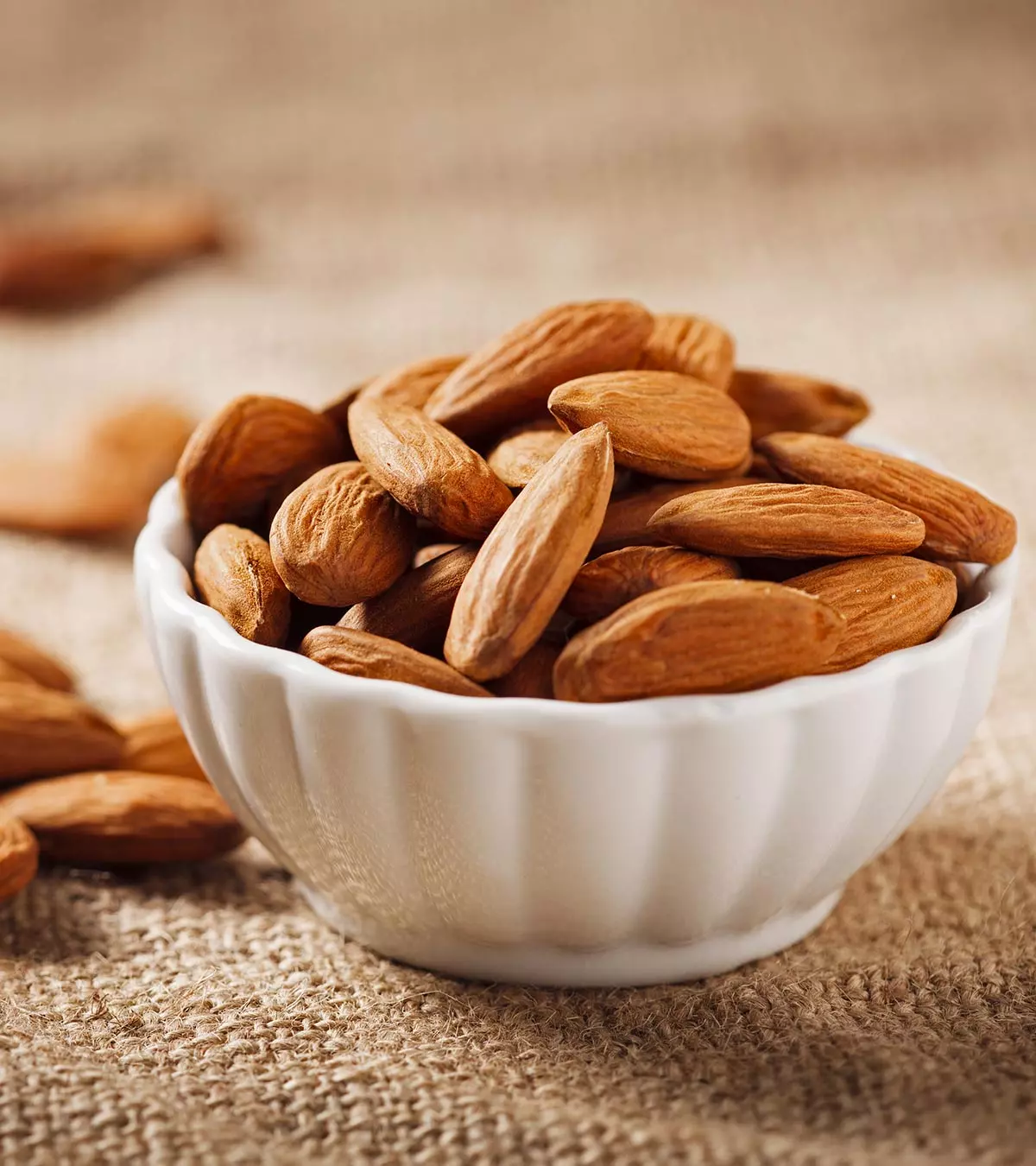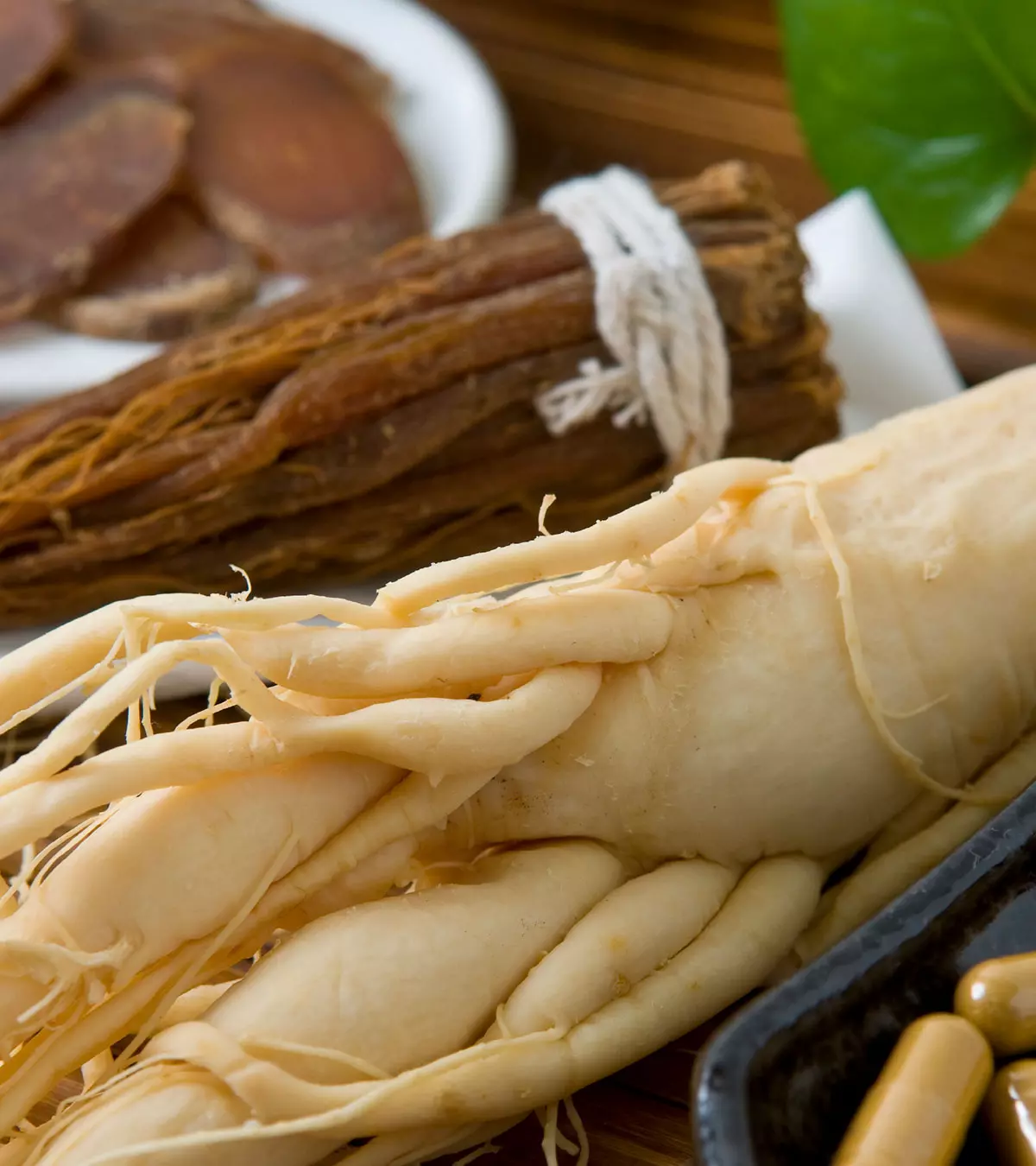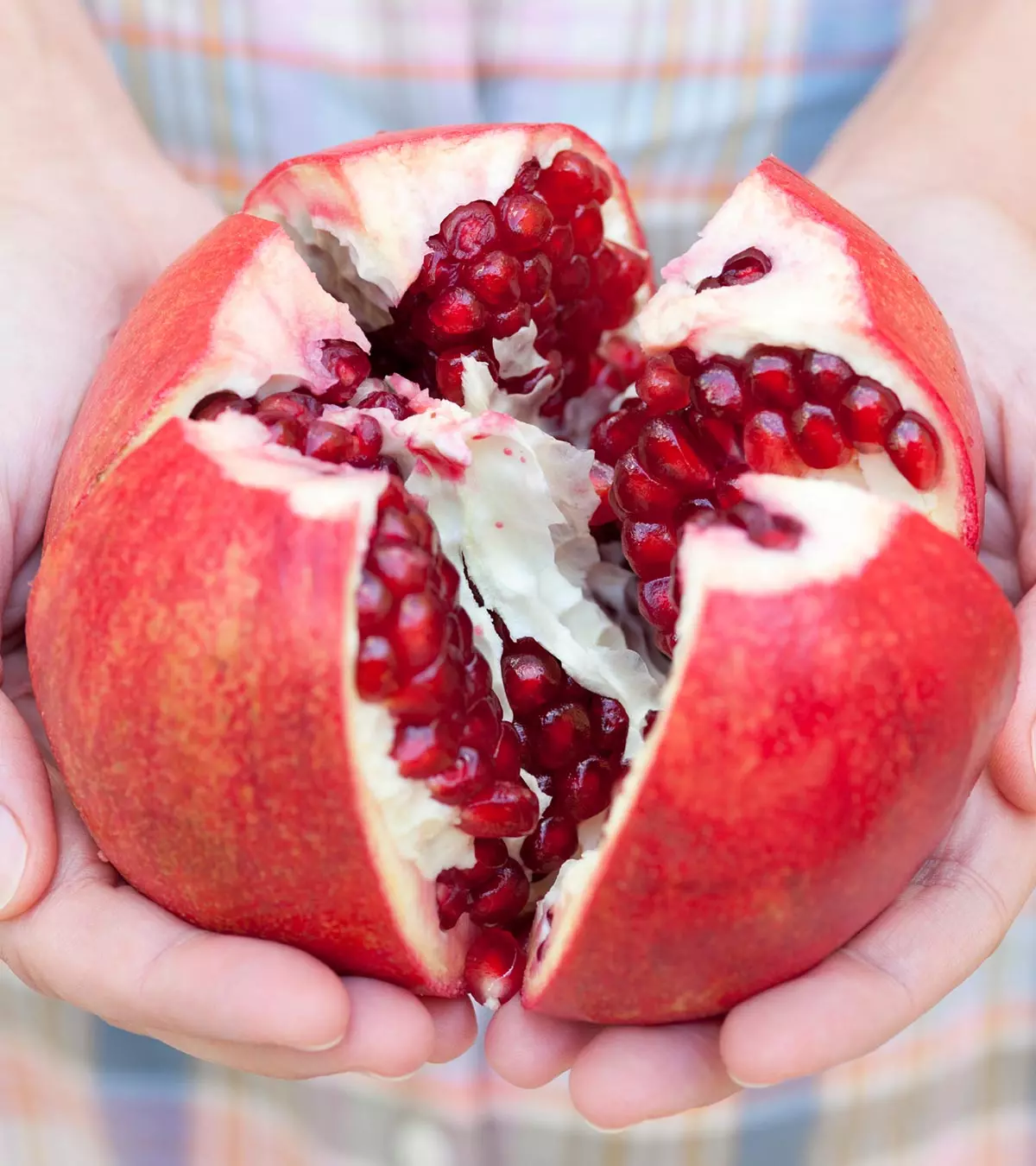
Image: ShutterStock

Many women may have low hemoglobin counts while breastfeeding. If you are among them, eating fruits such as pomegranates while breastfeeding will be beneficial. Apart from improving your hemoglobin levels, this fruit is known to prevent some oral and dental conditions. Perhaps that is why the fruit is considered a superfood in several cultures.
Read this post to explore whether it is safe to consume pomegranates while breastfeeding and some of its potential health benefits. This article also provides some important details on the usefulness and possible side effects of consuming this nutritious fruit.
Key Pointers
- Pomegranates are safe to eat, but it is advisable to get a doctor’s recommendation for appropriate intake.
- Pomegranates help relieve digestive problems, promote oral health, and prevent kidney problems.
- Pomegranates prevent anemia and can also help treat osteoarthritis and atherosclerosis.
- Too many pomegranates may cause side effects such as rashes, hives, breathing, or swallowing problems.
What Is A Pomegranate?
A pomegranate is a flavorful, colorful, and nutritious fruit with spiny skin and distinctive crown to its red arilsiThe fleshy edible portion covering the seed of a fruit .
Pomegranate derives its name from its Middle French name ‘pomme garnete’ which means ‘seeded apple’. The fruit is also popular as Chinese apple and contains high amounts of nutrients. So, as a nursing mom, you should be keen on including it in your diet to meet your daily nutrition needs (1).
Is It Safe To Eat Pomegranates While Breastfeeding?
Yes! It is perfectly safe to drink pomegranate juice while you breastfeed your baby. However, you should avoid a high intake of pomegranates while nursing. Consult your doctor before you raise the intake of pomegranate in your diet. The doctor will analyze your condition and recommend the appropriate intake of the fruit to ensure the safety of your newborn.
 Point to consider
Point to considerHealth Benefits Of Eating Pomegranate While Breastfeeding
Pomegranate is a juicy fruit that can provide hydration. Besides, it contains several nutrients and antioxidants that benefit the nursing mother and her breastfeeding baby. Here are some benefits of including pomegranate in your nursing diet.
1. Cures stomach disorders
Pomegranate juice could treat stomach disorders, such as cholera and dysentery. Drinking fresh pomegranate juice relieves digestive problems while nursing a newborn (1).
2. Dental care

Image: Shutterstock
Another benefit of consuming pomegranate or pomegranate juice is that it helps minimize hazardous effects of dental plaque and prevents several oral ailments. Pomegranate possesses antiviral and antibacterial properties that ensure your dental hygiene and care (2).
3. Prevents anemia
Pomegranate fruit and its juice help enhance blood flow in the body. The fruit’s high iron content can help minimize the symptoms of anemia in the postpartum period and can effectively treat fatigue, dizziness, hearing loss, and exhaustion (3).
4. Treats osteoarthritis
Pomegranate treats the hardening and thickening of arterial walls, joints, and cartilages. This property makes pomegranate an effective treatment for osteoarthritisiA form of arthritis that only impacts the joints causing inflammation and pain and atherosclerosisiHardening of the arteries due to accumulation of fats, cholesterol, and other substances effectively. Also, eating pomegranate prevents the production of enzymes that sever connective tissues in your body.
5. Potassium-rich
Pomegranate is an excellent source of potassium, so it prevents kidney problems and infections while you are nursing your newborn.
6. Rich source of vitamin C and fiber
Pomegranate seeds contain high amounts of vitamin C, so much so that it helps fulfill your 40% daily recommended intake of the crucial nutrient essential to maintaining a robust immune system. Also, high levels of fiber in the fruit regulate blood pressure and satiate your hunger. If you find it difficult to chew and eat pomegranate seeds, you can place them as toppings in your oatmeal or yogurt and eat them.
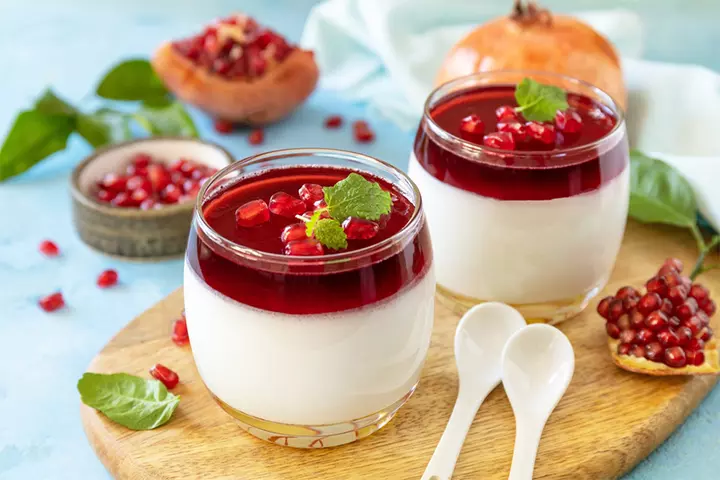
Image: Shutterstock
Pomegranate seeds contain high amounts of vitamin C so much so that it helps fulfills your 40% daily recommended intake of the crucial nutrient. Also, high levels of fiber in the fruit regulate blood pressure and satiate your hunger. If you find it difficult to chew and eat pomegranate seeds, you can place them as toppings in your oatmeal or yogurt and eat.
Besides several nutrients mentioned above, pomegranate also contains a good amount of sugar. Several studies examined the amount of sugar found in pomegranate juice. Results of one such study are depicted in the graphical representation below.

Major sugar components of the pomegranate juice
Source: Primary metabolites, Anthocyanins, and Hydrolyzable Tannins in the Pomegranate Fruit; Frontiers in Plant ScienceThe findings reveal that glucose and fructose are main sugars in the pomegranate juice, whereas maltose and sucrose are found in relatively small amounts.
 Research finds
Research findsPossible Side Effects Of Eating Pomegranate During Breastfeeding
While nursing women rarely experience side effects from eating pomegranates, some may have allergic reactions. Here are some possible side effects:
- Unexplained rash or itching
- HivesiA skin rash caused by medications, common allergens, or specific medical treatments
- Difficulty while breathing or wheezing
- Difficulty while swallowing

Image: Shutterstock
- Swollen lips, throat, mouth, or tongue (1)
Further, excessive pomegranate consumption, even in the absence of allergies to the fruit, may cause diarrhea in a few nursing mothers. Pomegranate juice may interact with certain medications taken for blood pressure, which may be concerning while breastfeeding (8).
Frequently Asked Questions
1. Does pomegranate juice increase breast milk?
There is no scientific evidence that suggests that pomegranate juice increases the supply of breast milk. However, the Unani system of medicines mentions it in the treatment for insufficient breast milk production along with other substances (4).
2. Is pomegranate juice good for healing after delivery?
Pomegranate, with its strong antioxidant and anti-inflammatory properties, has been found effective in aiding the wound healing process (5). Hence, it may be good for healing after both vaginal or C-section delivery.
4. Does pomegranate cause constipation in babies while breastfeeding?
There is no medical evidence that links maternal pomegranate consumption and constipation in babies. However, it is recommended to eat or drink any fruit or fruit juice in moderation.
3. Can eating pomegranates affect the taste, color, and consistency of breast milk?
Studies have indicated pomegranate juice has compounds that pass from the mother to the infant through breast milk (6). However, there is no evidence to suggest that pomegranate juice may alter or affect breast milk’s taste, color, or consistency.
4. Can pomegranate help with postpartum recovery while breastfeeding?
Very little scientific evidence exists to support the efficacy of pomegranate in postpartum recovery while breastfeeding. However, in Ayurveda, pomegranate is one of the most recommended fruits to eat while breastfeeding for overall well-being (7).
5. Can consuming pomegranate lead to gas or digestive issues in breastfed babies?
There is little evidence to suggest that it may cause gas or digestive issues in breastfed babies.
6. Are there any specific ways to incorporate pomegranate into a breastfeeding diet?
You can include pomegranate in your fruit or vegetable on a breastfeeding diet for a sweet and tangy flavor. You can sprinkle the seeds on your yogurt and oatmeal for breakfast or grilled meat dishes for dinner.
7. Does pomegranate have any potential interactions with breastfeeding medications or supplements?
Limited studies indicate pomegranate’s interaction with ACE inhibitors, statins, blood pressure medications, and warfarin (8). If you are using any of these medicines, you can consult your doctor before consuming
Pomegranate is a nutritious fruit that is safe to consume during breastfeeding. Consuming pomegranate while breastfeeding may help relieve digestive issues and reduce anemia. Select organic and fresh pomegranates. Also, it is advisable to consume whole fruit rather than its juice to avoid the loss of nutrients and gain fiber. However, if you are unsure about how to consume pomegranate, seek the help of a dietician. If you note any signs of allergy within you or your baby after consuming pomegranate, stop its intake and consult a doctor.
Infographic: Advantages Of Consuming Pomegranate When Breastfeeding
Pomegranates are a good source of iron and other essential nutrients for a nursing mother. Scroll through the infographic below to learn about the potential benefits of pomegranates for breastfeeding mothers.
Some thing wrong with infographic shortcode. please verify shortcode syntaxIllustration: Wonderful Health Benefits Of Eating Pomegranates While Breastfeeding
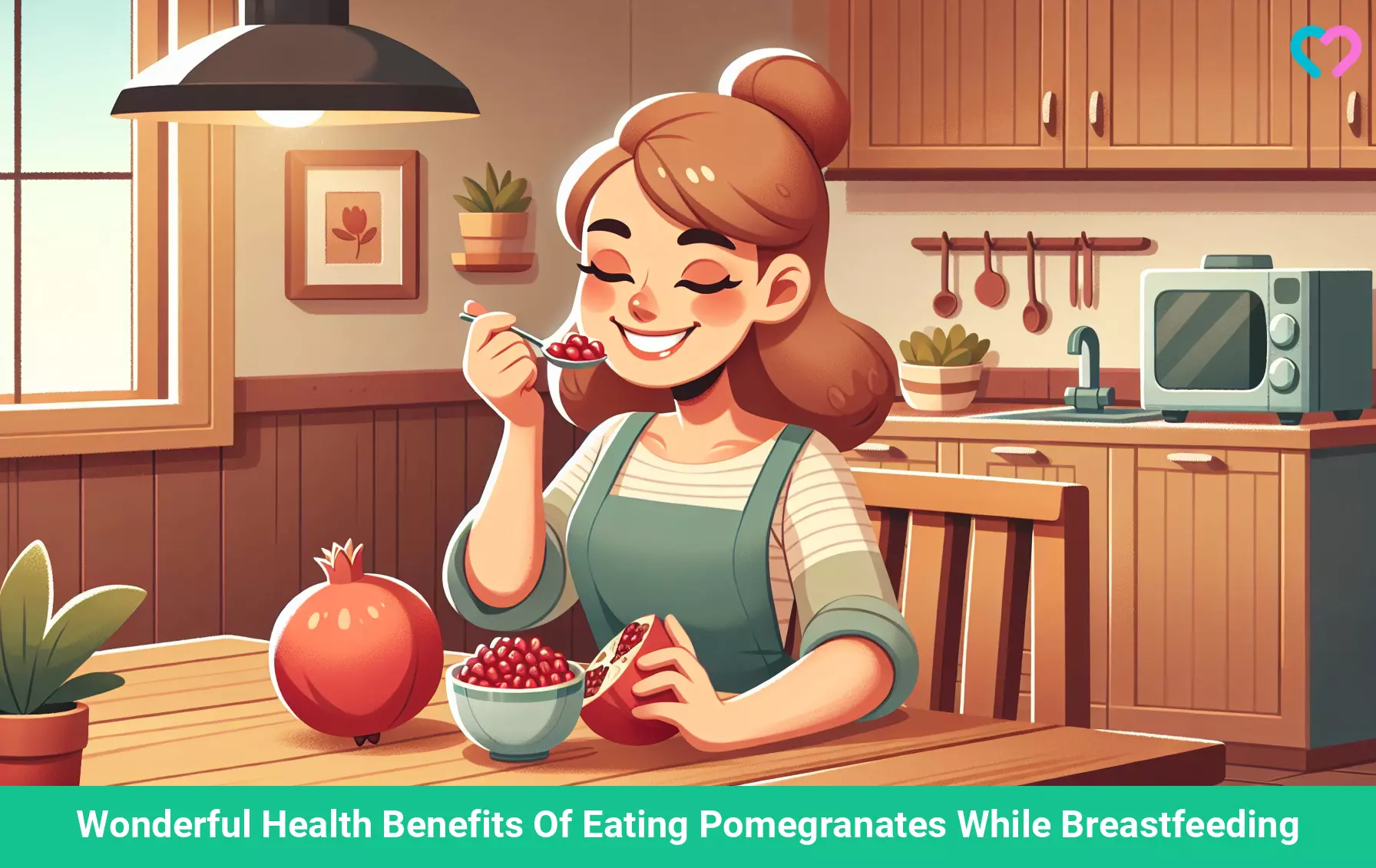
Image: Dall·E/MomJunction Design Team
References
- Pomegranate.
https://www.nccih.nih.gov/health/pomegranate - Somsri Wiwanitkit and Viroj Wiwanitkit; Pomegranate juice on dental plaque microorganisms.
https://www.ncbi.nlm.nih.gov/pmc/articles/PMC3644762/ - Ramasamy Harikrishnan et al.; (2012); Pomegranate enriched diet enhances the hematology, innate immune response, and disease resistance in olive flounder against Philasterides dicentrarchi.
https://search.nal.usda.gov/discovery/search?query=lds35,contains,424286-01nal_inst,AND&tab=LibraryCatalog&search_scope=MyInstitution&vid=01NAL_INST:MAIN&mode=advanced&offset=0 - Arshiya Sultana and Khaleeq ur Rahman; (2014); Traditional Unani perspective of perceived insufficient milk (Qillatul Laban) and Galactogogues: A literary research with recent studies.
http://kpubs.org/index.jsp?articleANo=TJHOBI_2014_v4n3_19 - Valentina Stefanou st al.; (2025); Wound Healing Properties of Pomegranate.
https://www.researchgate.net/publication/353999285_Wound_Healing_Properties_of_Pomegranate - Susanne M. Henning et al.; (2025); Pomegranate juice alters the microbiota in breast milk and infant stool: a pilot study.
https://pubs.rsc.org/en/content/articlelanding/2025/fo/d2fo00280a - Ayurveda for mother and child
https://ayurveda-akademie.org/en/knowledge/ayurveda/ayurvedic-medicine/articles-on-ayurvedic-medicine/ayurveda-for-mother-and-child - Pomegranate
https://www.mountsinai.org/health-library/herb/pomegranate#:~:text=Possible%20Interactions
Community Experiences
Join the conversation and become a part of our nurturing community! Share your stories, experiences, and insights to connect with fellow parents.
Read full bio of Arushi Agrawal
Read full bio of Jessica Albert
Read full bio of Swati Patwal
Read full bio of Anindita Ghatak







